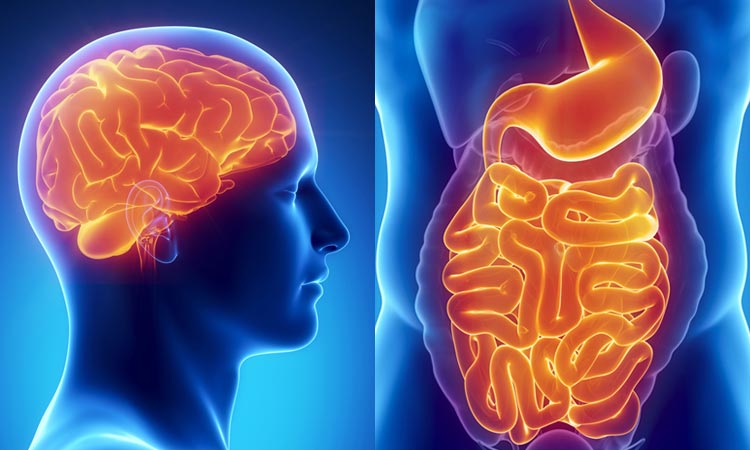“By bringing more awareness to our gut, and what we put in it, we can make a substantial difference in our overall health.”
-Rose Caiola
Hope for solutions to a healthy brain
Experts have only begun to unravel the intricacies of what is now referred to as the gut-brain connection. Research into the human microbiota and its impact on our minds is still in its infancy. Indeed, an emerging field of research is now focused solely on how the state of one’s gut health influences important aspects of brain development, cognition, behavior and mood control.
What we do know is that gut health – also called the microbiome, which encompasses trillions of bacteria and other microbes populating the human GI tract – is vitally important to overall health and wellbeing. When the gut is compromised, everything else tends to go into a tailspin.
Leaky gut syndrome, also referred to as intestinal hyper-permeability, is a condition that occurs when the intestinal lining is damaged, thus allowing toxins, undigested food proteins and other foreign invaders into the bloodstream. When the tight junctions of the intestines – considered the gateway between the GI tract and the blood-brain barrier – open up to allow foreign particles through, an inflammatory cascade usually results. When these rising levels of inflammation persist for long periods of time due to untreated leaky gut, the body can begin to attack healthy tissue and alter healthy hormone levels, contributing to numerous emotional, neurological issues.
This process occurs through interactions between the microbiota and the gut mucosa that regulate the production of several pro-inflammatory chemicals, called cytokines. With leaky gut, these inflammatory cytokines enter the bloodstream and then pass through the blood-brain barrier. And once in the brain, this inflammation can cause serious consequences, such as decreased production of the feel-good hormone, serotonin, and the sleep-inducing hormone, melatonin.
As a result, both altering the gut microbiota and treating leaky gut syndrome are now considered key focuses in the prevention and treatment of the world’s most common mental health disorders.
Here are four brain-related symptoms that may be caused by your poor gut health:
1. Restlessness or Anxiety

Certain nerves connect the digestive organs to the brain and spinal cord, helping to control the release of chemicals that stimulate relaxation, or those that cause feelings of anxiety. You may be aware that many digestive disorders are caused by stress, but you may not realize that digestive disorders can actually cause stress. For example, nerve stimulation in the digestive system can sometimes cause anxious symptoms in the mind, as a result of things like muscle contraction or lack of sleep.
The gut-brain connection is also impacted by dietary and lifestyle choices, through alterations in neurotransmitter functions beginning in the gut, fluctuations in blood sugar levels and changes in energy expenditure or appetite.
High intake of inflammatory foods – like added sugar, processed grains (such as those containing gluten) or high amounts of caffeine or alcohol – make matters worse because these foods are not well tolerated by those with a sensitive, leaky gut. If you already have a compromised digestive system – as many people eating a western diet do – consuming these foods may contribute to sensitivities, hormonal changes and other inflammatory reactions that further increase moodiness.
2. Ongoing Fatigue

Leaky gut syndrome is now associated with the development of at least several autoimmune diseases, including one called Hashimoto’s disease, which affects the thyroid gland.
Sometimes referred to as chronic thyroiditis, inflammatory processes leading to Hashimoto’s causes similar symptoms to hypothyroidism, including persistent fatigue, symptoms of depression, weakness and sometimes weight gain. Furthermore, various nutritional deficiencies can result from leaky gut syndrome – such as in vitamin B12 or B6 – which can further contribute to sluggishness.
3. Changes In Appetite and Cravings

Did you know that appetite and digestion actually begin in the brain? The hypothalamus, a chief controller of metabolic processes, stimulates your appetite and also helps you feel satiated after eating. Gut troubles may change your desire for food because the microbiota communicate with the brain and control the release of hormones like ghrelin, often called the hunger hormone, and leptin, the fullness hormone. For this reason, researchers are now linking obesity to poor gut health and a possible lack of good probiotic bacteria.
4. Poor Memory and Trouble Concentrating

Harmful metabolites produced from the bad bacteria that proliferate in a leaky gut are now associated with neurochemical changes that may increase the risk for cognitive disorders, including Alzheimer’s disease and dementia. Studies suggest that poor gut health might turn on certain genetic factors that impair cognition. Although there are multiple other risk factors involved, leaky gut also seems to play a role in the development of learning disabilities, such as ADHD and possibly autism-spectrum disorders.
Gut permeability can contribute to symptoms such as poor concentration, brain-fog and overall mood dysfunction in several ways: altering neurotransmitters or neuromodulators, impacting nutrient availability or absorption, and affecting the adrenal or thyroid glands.
The good news is there’s now evidence that positive changes to gut health, which result from habits like consuming fermented foods with probiotics and prebiotics, may help lower your chance for dementia and other cognitive problems.



